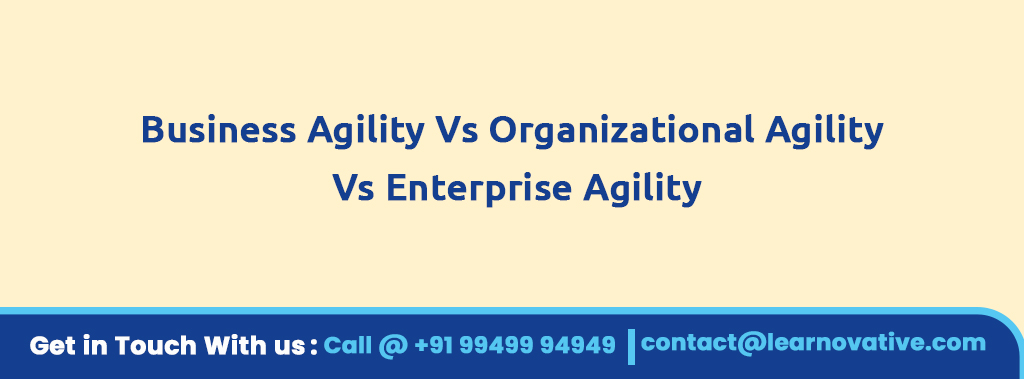In the realm of organizational development and strategic management, terms such as Business Agility, Organizational Agility, and Enterprise Agility often surface, each carrying its own set of implications. This article aims to unravel the distinctions between Business Agility, Organizational Agility, and Enterprise Agility, providing clarity on their meanings and applications within the business world.
Business Agility:
Business Agility is a concept that centers on the ability of a business or a specific business unit to swiftly adapt to changing market conditions, customer needs, and emerging opportunities. It emphasizes the capacity to respond to disruptions, implement innovative solutions, and pivot strategies in a nimble and efficient manner. Business Agility is often associated with the agility of specific business functions, like marketing, sales, and product development, and is driven by the desire to remain competitive in a rapidly evolving marketplace.
Organizational Agility:
Organizational Agility is a strategic approach that emphasizes an organization’s ability to respond rapidly and effectively to changes in its external environment. It involves cultivating a culture of flexibility, collaboration, and innovation at all levels of the organization. Organizational Agility extends beyond specific projects or business units; it encompasses the entire organization’s capacity to adapt to market shifts, technological advancements, and customer preferences. This approach often involves the adoption of agile methods, iterative processes, and a continuous improvement mindset.
Key Aspects of Organizational Agility:
- Quick response to market changes.
- Flexibility in adapting to customer needs.
- Collaboration across departments and teams.
- Emphasis on iterative and incremental processes.
- Continuous learning and improvement.
Enterprise Agility:
Enterprise Agility is the highest level of adaptability and responsiveness within an organization. It transcends individual business units and considers the organization as a whole. It takes the concept of organizational adaptability to a broader and more strategic level. It involves aligning all aspects of the enterprise, including strategy, structure, processes, and culture, to enhance the organization’s overall responsiveness to change. Enterprise Agility acknowledges that adaptability should be ingrained in the organizational DNA, influencing decision-making, resource allocation, and long-term planning. Achieving Enterprise Agility requires a systemic approach that integrates various functions, ensuring that the entire organization is poised to navigate uncertainties effectively.
Key Aspects of Enterprise Agility:
- Holistic alignment of strategy and execution.
- Integration of agile values and principles across the organization.
- Cross-functional collaboration and communication.
- Leadership commitment to fostering an agile culture.
- Strategic adaptability in long-term planning.
Conclusion:
In conclusion, the distinctions between Business Agility, Organizational Agility, and Enterprise Agility lie in their scope and focus. Business Agility addresses the adaptability of specific business functions, Organizational Agility extends this adaptability to the entire organization, and Enterprise Agility takes a holistic approach, ensuring the organization as a whole is equipped to navigate uncertainty and capitalize on opportunities.
Understanding these nuances is crucial for businesses seeking to enhance their agility strategically. By recognizing the specific areas of focus within these terms, organizations can tailor their initiatives and interventions to create a more agile and resilient business environment, enabling sustained success in an ever-changing business landscape.
In conclusion, understanding the distinctions between Business Agility, Organizational Agility, and Enterprise Agility is essential for businesses. For professionals and organizations in Hyderabad, investing in Agile Scrum Courses, obtaining Agile Certifications, or undergoing Agile Transformation Courses can enhance agility and competitiveness. With the right training, they can lead in fostering Business Agility, Organizational Agility, and Enterprise Agility, ensuring success in the dynamic business landscape of Hyderabad.


